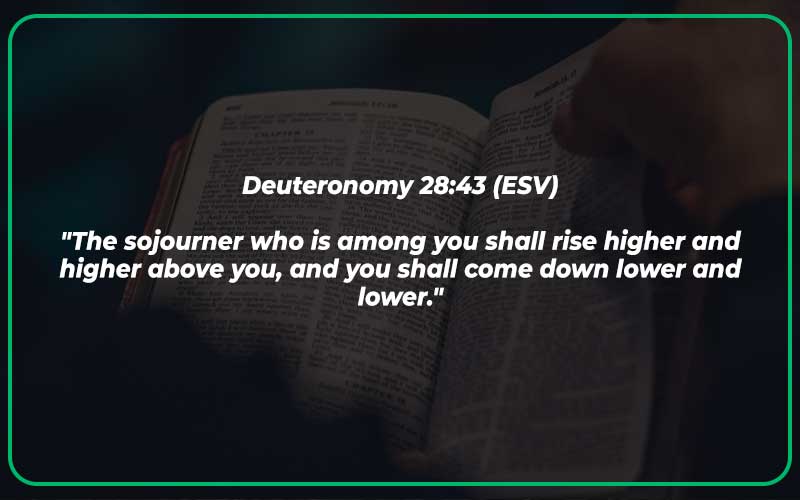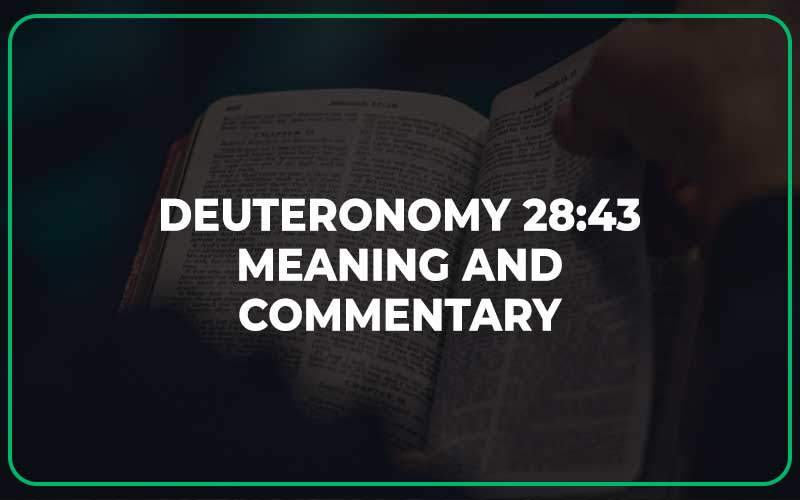Deuteronomy 28:43 (ESV)
“The sojourner who is among you shall rise higher and higher above you, and you shall come down lower and lower.”
Deuteronomy 28:43 Meaning
Deuteronomy 28:43 speaks about the consequences of disobedience to God’s commands. It foretells that if the Israelites fail to follow God’s laws, they will experience the oppression and subjugation of foreign nations. The foreigners, who were originally living among the Israelites as foreigners or residents, will become powerful, while the Israelites will decline in power and influence.
Deuteronomy 28:43 Commentary and Explanation
Deuteronomy 28:43 is a verse that reveals a significant aspect of God’s covenant with the Israelites, detailing the consequences of disobedience.
In Deuteronomy 28:43, it is written, “The sojourner who is among you shall rise higher and higher above you, and you shall come down lower and lower.” This verse serves as a warning from God to the Israelites about the consequences of their disobedience and departure from His commandments. It highlights a shift in the socio-economic status of the Israelites in the event of their rebellion against God.
Firstly, the mention of “the sojourner among you” refers to foreigners who reside within the Israelite community. This verse implies that when the people of Israel turn away from God’s ways, foreigners and those outside the covenant will prosper and gain prominence within the land. This shift in fortunes symbolizes the loss of God’s favor and protection.
This verse echoes similar warnings found in other parts of the Bible, particularly in Leviticus 26:17, where God states, “I will set my face against you, and you shall be struck down before your enemies.” Here, we see a connection between disobedience and vulnerability to external forces.
Additionally, the phrase “you shall come down lower and lower” underscores the idea that disobedience would lead to a decline in the Israelites’ well-being and prosperity. This decline is further emphasized in Leviticus 26:38-40, where God promises that if His people repent and confess their iniquity, He will remember His covenant and restore their fortunes.
In Isaiah 1:19-20, we find a similar theme: “If you are willing and obedient, you shall eat the good of the land; but if you refuse and rebel, you shall be eaten by the sword.” This passage reiterates the principle that obedience to God’s commandments brings blessings, while disobedience leads to adversity.
Therefore, when we reflect on Deuteronomy 28:43 in light of these cross-referenced verses, we understand that God’s covenant with His people is conditional. Obedience results in blessings and prosperity, while disobedience leads to adversity and loss of privilege. As a collective community, we are reminded of the importance of staying faithful to God’s commandments to maintain His favor and protection in our lives.
Deuteronomy 28:43 serves as a solemn warning for us to remain obedient to God’s commandments, reminding us that our prosperity and well-being are intricately tied to our faithfulness. It underscores the timeless truth that God’s promises are fulfilled when we walk in obedience and faith, and we should heed this message to experience His blessings in our lives.
Also Read: Genesis 27:3 Meaning and Commentary
Context of Deuteronomy 28:43
The book of Deuteronomy is a record of Moses’ final speeches to the Israelites before they crossed the Jordan River. Moses reminded them of their journey from Egypt and recounted the laws and commandments given by God. The purpose was to ensure that the Israelites understood the expectations and requirements of their covenant relationship with God.
In Deuteronomy 28, Moses presented the blessings and curses that would come upon the Israelites based on their response to God’s laws. They were given a choice—to either follow God and be blessed or disobey and suffer the consequences. The verse in question falls within the section describing the curses that would befall the Israelites if they turned away from God.

Breaking Down the Key Parts of Deuteronomy 28:43
a) “The foreigners who reside among you”: This refers to the non-Israelites who were living among the Israelites, either as foreigners or residents. They were people from other nations who had integrated into Israelite society for various reasons.
b) “Will rise above you higher and higher”: This indicates that these foreigners, who were originally in a subordinate position, would gradually gain power and prominence. They would surpass the Israelites in terms of influence, wealth, and authority.
c) “But you will sink lower and lower”: In contrast to the foreigners’ rise, the Israelites would decline both socially and economically. They would experience a loss of power, prosperity, and freedom. This serves as a warning of the consequences of disobedience to God’s commands.
Bible Study on Deuteronomy 28:43
To understand the gravity of this verse and apply its wisdom to our lives, we need to reflect on a few key points. Firstly, we should recognize the importance of remaining faithful to God and not turning away from His ways. In our modern context, this means avoiding the temptation to worship other gods or idols such as material possessions, success, or personal desires that take precedence over our relationship with God.
Secondly, we must acknowledge the danger of allowing worldly influences to surpass God in our lives. It is easy to be swayed by the ideologies, trends, and values of the societies we live in. However, as Christians, our allegiance should always be to God and His word. We must be discerning and resist conforming to the ways of the world that contradict God’s principles.
Lastly, this verse reminds us of the importance of humility. God calls us to humble ourselves before Him and acknowledge His sovereignty. When we become proud and self-reliant, thinking that our own strength or accomplishments are sufficient, we open ourselves to the possibility of God humbling us. It is essential to remember that any success or prosperity we experience is a result of God’s grace and favor, not our own abilities.
Biblical Translations of Deuteronomy 28:43
Deuteronomy 28:43 New International Version (NIV)
“The foreigners who reside among you will rise above you higher and higher, but you will sink lower and lower.”
Deuteronomy 28:43 King James Version (KJV):
“The stranger that is within thee shall get up above thee very high; and thou shalt come down very low.”
Deuteronomy 28:43 New American Standard Bible (NASB)
“The stranger who is among you shall rise above you higher and higher, but you will go down lower and lower.”
Deuteronomy 28:43 New King James Version (NKJV)
“The alien who is among you shall rise higher and higher above you, and you shall come down lower and lower.”
Deuteronomy 28:43 New Living Translation (NLT)
“The foreigners living among you will become stronger and stronger, while you become weaker and weaker.”
Deuteronomy 28:43 Berean Study Bible (BSB)
“The foreigner living among you will rise higher and higher above you, while you sink down lower and lower.”
Final Thoughts
Deuteronomy 28:43 serves as a powerful reminder of the consequences of disobedience and the importance of faithfulness to God. It warns us against straying from His commandments and emphasizes the significance of humility and steadfast devotion.
As Christians, we are called to embrace obedience, seek God’s will, and rely on His guidance. By doing so, we can avoid the pitfalls of idolatry, find true blessings in our lives, and experience the fullness of God’s love and provision.

